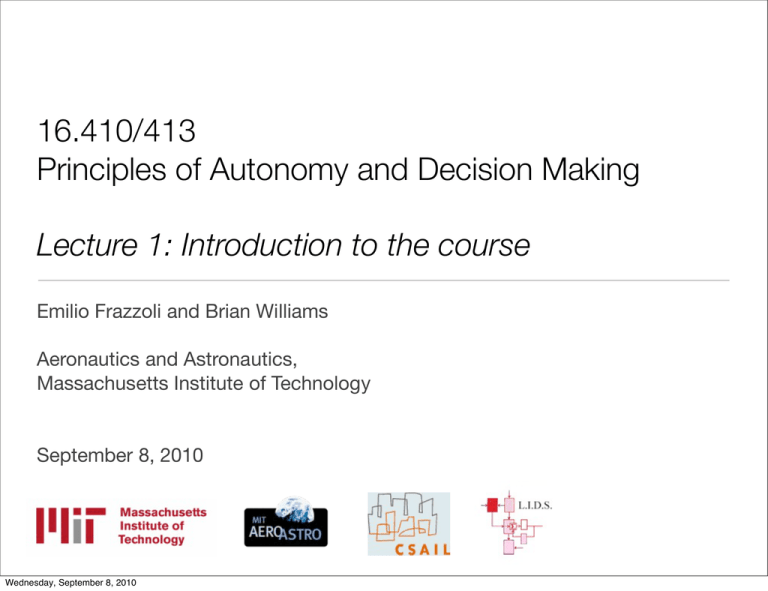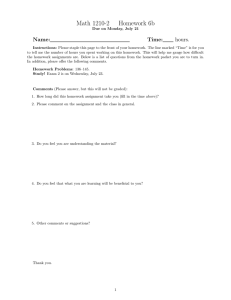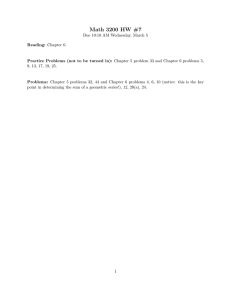16.410/413 Principles of Autonomy and Decision Making
advertisement

16.410/413 Principles of Autonomy and Decision Making Lecture 1: Introduction to the course Emilio Frazzoli and Brian Williams Aeronautics and Astronautics, Massachusetts Institute of Technology September 8, 2010 Wednesday, September 8, 2010 Outline • Introduction • Examples of autonomy in aerospace systems and robotics • Syllabus • Course Objectives • Course Staff • Logistics • Assignments and Grading • Course Overview Wednesday, September 8, 2010 Textbooks and programming languages • Primary textbook: • [AIMA] “Artificial Intelligence: A Modern Approach,” by S. Russell and P. Norvig (Prentice Hall), 3nd Edition • Other recommended textbooks: • [PA] “Planning Algorithms,” by S. LaValle (Cambridge Press), available at http://planning.cs.uiuc.edu/ • [IOR] “Introduction to Operations Research,” by F. S. Hillier and G. J. Lieberman (McGraw-Hill). • Programming: • All programming in this course will be done in Java. • A good Java reference is [JINS] “Java in a Nutshell” by D. Flanagan (O'Reilly). Wednesday, September 8, 2010 Assignments and Grading • Reading assignments • We highly recommend reading the assigned material before the lecture in which it will be covered • Problem sets: • Problem sets are released weekly, and will include • modeling/analysis problems; • programming assignments; • Problem sets are due in class, or to the course administrator by 4:45pm of the due date, unless otherwise indicated, or arranged in advance with the instructors. • Exams: • There will be a mid-term exam on Oct 20 (mark the date), and a final exam Wednesday, September 8, 2010 Assignments and grading(cont’d) • Term project: • Students in 16.413 will be required to complete a project (to be discussed) • Grading schemes: • Your grade in 16.410 or 16.413 will be determined according to the following approximate weights (adjustments may be made based on factors such as, e.g., class participation): • 16.410: mid-term (25%), final (40%), and psets (35%) • 16.413: mid-term (20%), final (35%), project (20%), and psets (25%) • Furthermore: • Must complete all assignments for a passing grade. • Late assignments lose 20% per day (or fraction) after the deadline. • Exams will be closed-book, with one sheet of handwritten notes allowed Wednesday, September 8, 2010 Tentative Schedule • Introduction: • 9/8,W: Course objectives, logistics, and overview • State-space search: • 9/13,M: Formulating problem solving as state-space search • 9/15,W: Analysis of uninformed search • Global path planning: • 9/21, M: Formulating Path Planning using Roadmaps. • Constraint Programming • 9/22, W: Visual interpretation and scheduling • 9/27, M: Constraint satisfaction Wednesday, September 8, 2010 Tentative schedule • Propositional Logic • 9/29, W: Propositional Formulas, Models and Propositional Satisfiability, Propositional Inference and Entailment • Activity Planning and Execution • 10/4, M: Operator-based Planning Problems and Plan Graphs, Plan Generation using Plan Graphs. • 10/6, W: Planning and Execution in a Changing World. • Autonomy architecture and case studies • 10/13, W: Space probes, vehicles and human-robot coordination • 10/18, M: TBD • 10/20, W: Midterm Exam Wednesday, September 8, 2010 Tentative schedule • Constraint Optimization • 10/25, M: Finite-domain constraint optimization, Conflict learning. • 10/27, W: Consistency-based diagnosis, Multiple-fault diagnosis, Mode estimation and active probing • Global Path Planning (cont’d) • 11/1, M: Exploring Roadmaps using Informed Search. Weighted graphs; shortest path problems; DP, A*, B&B. • 11/3, W: Incremental sampling methods, PRM/RRT/RRT* • Mathematical Programming • 11/8, M: Formulating planning, scheduling, and resource allocation problems as mathematical programs • 11/10, W: Linear Programs (LPs): The simplex algorithm. • 11/15, M: Mixed-Integer Linear Programs (MILPs) Wednesday, September 8, 2010 Tentative schedule • Reasoning in an uncertain world • 11/17, W: Probabilistic Inference, graphical models. • Sensing in an uncertain world • 11/22, M: Hidden Markov Models (HMMs): robot localization and mapping • 11/24, W: HMMs: algorithms • Acting in an uncertain world • 11/29, M: Dynamic programming and stochastic control, Markov Decision Processes (MDPs) • Acting in an adversarial world • 12/6, M: Matrix and sequential games, alpha-beta pruning • 12/8, W: Mechanism design and auctions. Introduction to differential games, pursuit-evasion, and collision avoidance. Wednesday, September 8, 2010 MIT OpenCourseWare http://ocw.mit.edu 16.410 / 16.413 Principles of Autonomy and Decision Making Fall 2010 For information about citing these materials or our Terms of Use, visit: http://ocw.mit.edu/terms.


